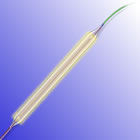|
The new data come from the BELLO (Balloon Elution and Late Loss Optimization) study, which enrolled 182 patients across 15 hospitals in Italy to evaluate the safety and effectiveness of two medical devices: Medtronic's IN.PACT Falcondrug-eluting balloon (DEB) and the Taxus drug-eluting stent (DES) from Boston Scientific Corp. Nearly two-thirds (64.9%) of the vessels treated in the BELLO study with the drug-eluting balloon were smaller than 2.25mm in diameter, for which no drug-eluting stent is currently available. The previously presented six-month angiographic outcomes of the BELLO study favored patients treated with the drug-eluting balloon. The study met its primary endpoint, late lumen loss at six months, with statistical significance showing superiority of the drug-eluting balloon over the drug-eluting stent (0.08 mm vs. 0.29 mm, p=0.001). Building on these data, the latest results from the BELLO study continue to demonstrate favorable outcomes for the IN.PACT Falcon drug-eluting balloon. At one year, the clinical outcomes of major adverse cardiac events (MACE), myocardial infarction (MI) and target lesion revascularization (TLR) were statistically similar for both devices:
"The BELLO study shows that treating de novo coronary lesions with the IN.PACT Falcon drug-eluting balloon is a viable option, with strong clinical outcomes to one year," said the presenter of the new data, Dr. Azeem Latib of San Raffaele Hospital and EMO-GVM Centro Cuore Columbus in Milan. "The one-year results suggest that this novel angioplasty device should not necessarily be limited to only treating in-stent restenosis in coronary arteries. They also suggest that lesions in relatively small coronary arteries are possibly a strong application for this particular device." The Medtronic IN.PACT Falcon drug-eluting balloon received CE (Conformité Européenne) mark in 2009 and is available in many countries around the world. It is not commercially available in the United States. In collaboration with leading clinicians, researchers and scientists around the world, Medtronic offers the broadest range of innovative medical technology for the interventional and surgical treatment of cardiovascular disease and cardiac arrhythmias. The company strives to offer products and services that deliver clinical and economic value to healthcare consumers and providers worldwide. About Medtronic Source: Medtronic, Inc. |

